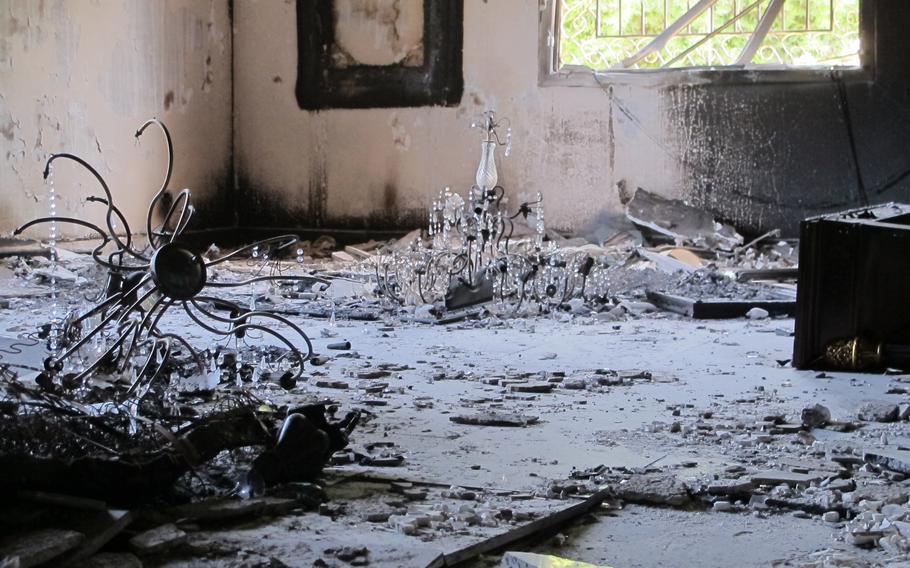
Fire damage in the main compound where ambassador J. Christopher Stevens died of smoke inhalation during the Sept. 11, 2012, attacks on U.S. diplomatic and intelligence facilities in Benghazi, Libya. (Michael Birnbaum/The Washington Post)
A militia leader convicted in the deadly 2012 attacks on U.S. diplomatic and intelligence facilities in Benghazi, Libya, was sentenced to 28 years in prison Thursday after a federal appeals court ruled that his initial term of 22 years was “unreasonably low in light of the gravity of his crimes of terrorism.”
Ahmed Abu Khatalla, 53, was convicted in 2017 of four offenses stemming from the attacks but acquitted of criminal culpability in the deaths of four Americans, including J. Christopher Stevens, the U.S. ambassador to Libya. Although prosecutors initially sought a life term for Khatalla, Judge Christopher R. Cooper in U.S. District Court in D.C. imposed a 22-year sentence in 2018, noting the jury’s findings regarding the deaths.
The government challenged the sentence, arguing that it was too lenient, and an appeals court agreed, ordering a resentencing. Khatalla has been locked up since his capture by U.S. Special Forces a decade ago and his new sentence, like his previous one, includes the time he already has spent behind bars.
“When we were last here six years ago, I tried as best as I could to explain how I arrived at that sentence,” Cooper said in court Thursday. He said that he had settled on 22 years after “a hell of a lot of thought and deliberation” and that he still believes the sentence was proper.
However, a three-judge panel of the U.S. Court of Appeals for the D.C. Circuit ruled unanimously in 2022 that Cooper had erred. The panel said advisory sentencing guidelines called for 30 years to life imprisonment in Khatalla’s case, and the fact that Khatalla had been acquitted of the most serious charges against him did not justify Cooper’s decision to depart from the guidelines and impose a lesser term.
“Those contemplating attacks on the United States, its official properties, and (most importantly) its personnel must know they will face severe consequences if apprehended and convicted,” the appellate judges wrote. “Their leaders even more so.”
Scores of Islamic extremists who shared al-Qaeda’s anti-Western militancy stormed and set fire to the compound on the 11th anniversary of the 9/11 attacks on the United States.
After an assistant U.S. attorney on Thursday again recommended a life sentence, defense lawyer Jeffrey D. Robinson asked Cooper to impose the same 22-year term and state his rationale differently, in a way that would pass muster with the Appeals Court.
But Cooper declined. “In my 10 years on the bench, I’ve always tried to faithfully apply the law as the [appeals court] sees it,” he said. Imposing the same sentence “would violate my obligation.” Yet he did depart from the guidelines, just not as much as he had before.
Survivors of the Americans killed in Benghazi watched from the courtroom gallery. “I know the prior sentence was unsatisfactory to you, and this one may be as well,” Cooper told them. But he said that imposing a 30- or 40-year term would be unjust.
Stevens’s brother-in-law, Peter Sullivan, seemed at peace with the revised sentence. “I didn’t expect it to be overwhelmingly changed,” he said outside the courtroom, adding, “Everyone did the best they could.”
Khatalla — identified in court records as Khatallah — was the first person convicted in the Benghazi attacks. A close ally, Mustafa al-Imam, was subsequently convicted of similar charges and sentenced to 19½ years in prison.
In a seven-week trial in 2017, jurors deliberated for five days before finding Khatalla guilty of four charges. They convicted him in the attack carried out on the night of Sept. 11, 2012, at a U.S. diplomatic facility in Benghazi, where Stevens and State Department employee Sean Smith died of smoke inhalation, and in a second attack before dawn Sept. 12 on a nearby CIA annex, where agency contractors Tyrone S. Woods and Glen Doherty were killed by mortar fire.
Khatalla’s trial moved the Benghazi inquiry from the partisan political realm — where Republican claims of a Democratic coverup continued through the 2016 presidential campaign — and into a courtroom, where the jury of 12 D.C. residents sorted through six binders of exhibits and hours of video evidence.
On Thursday, Cooper sentenced Khatalla to 15 years for providing material aid to terrorists, 15 years for conspiring to do so and 18 years for destroying a building, with all the terms to be served concurrently. The judge tacked on 10 years for the fourth charge, using a semiautomatic weapon during a violent crime, giving Khatalla a total of 28 years to serve.
Video recordings showed Khatalla entering a building at the compound with an AK-47 rifle just before midnight, about two hours after the initial assault began and half an hour before militants gained entry to the adjacent CIA facility. When he exited, he was seen gesturing for others to follow. Armed men linked by evidence to Khatalla and his militia were seen pouring gasoline and setting on the grounds.
Cooper noted that prosecutors could eventually “take another bite of the apple,” meaning file a new appeal, challenging the revised sentence. But he added, “I sincerely hope this will be the end of the road in this case.”